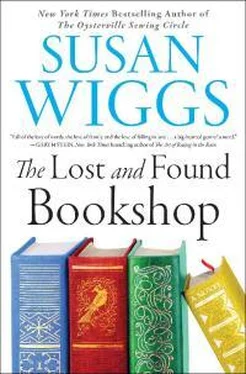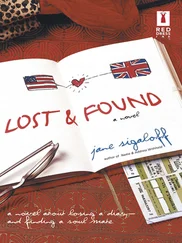“I’m so sorry about that. Did you know about the liens? The back taxes?”
“Blythe said she’d work out a payment plan.”
“Grandy, I looked at the numbers and there’s no way to dig out of this hole. I think we need to talk about putting the business and the building up for sale.” She paused, and when he didn’t say anything, she said, “There are some beautiful places for you to live in Archangel, up by me. I would love to be closer to you.” She showed him a collection of glossy brochures illustrated with smiling silver-haired people playing golf and bridge and laughing around the dinner table.
He responded with a long silence.
“Grandy?”
“I’m still here. It’s a no, Natalie.”
“But—”
“A hard no.”
She took a breath and spoke softly to hide her frustration. “I don’t want to pry you out of your home,” she said, “but I’m trying to come up with a strategy here. Foreclosure is a terrible option.”
“And I appreciate your concern. However, selling the building is not on the table. The shop has hidden value, and I’m certain we’ll manage. It’s where I’ve lived my life and where I intend to finish my days.”
Her heart sank. “I want to be able to provide that for you. Mom wanted it, too. But—”
“We’ll find it, Blythe, don’t you worry,” he said, gazing at her but obviously not seeing her. “My father would never lie about such a thing.”
She frowned. “Your father? You mean Mom’s grandpa Julius?”
“Don’t be impertinent. You’re talking nonsense.” His voice cut like a knife.
She didn’t let herself argue further. In some moments, he was uncharacteristically angry. She’d never known him to have a temper before. The medical reports on his condition, which she’d found in her mother’s files, indicated recently observed signs of dementia and called for more tests. The patient might become argumentative.
“Mom’s calendar shows an appointment with Dr. Yang on Tuesday.”
“He’s impertinent as well. Thinks he knows more about me than I myself do.”
“I’m sure he means to help.” Her stomach knotted. She felt horrible—guilty for subjecting him to the neurologist. Filled with dread at the prospect of pursuing the lawyer’s suggestion—to have her grandfather declared incompetent and taking the decision away from him.
She gazed across the table at his furious, troubled face. We’re not there yet, Grandy. She tried not to acknowledge the fact that they would get there one day. From her reading about dementia, it was progressive and, ultimately, fatal.
“You’re sad,” he said in a clipped voice. “Natalie’s a good daughter. Just different from you, Blythe.”
Natalie swallowed. Had Mom discussed her with Grandy? Complained about her? “Can we keep the appointment with Dr. Yang?”
“I’ll be ready. I won’t forget.”
* * *
“Count backward by sevens from one hundred,” the doctor instructed Andrew.
Andrew looked at the man blankly. Close-cropped hair, clipped fingernails, crisply enveloped in his white coat, the shine on his shoes reflecting the glare of the overhead lights, his eyes like two small mirrors.
Then Andrew looked around the tiled exam room. Blythe perched on a swivel stool, holding her fingers in knots of tension. Outside the window framed by bright steel, leaves turned to gold and coalesced into a flock of finches, then flew off.
It had been a bad night, a night of comets and tornadoes and bellyaches and the strange taste of metal in his mouth. He didn’t know this doctor. Did he? The white coat had a name embroidered on the breast pocket: David Yang, MD. Neurology.
“Mr. Harper?” the gentleman prodded. “Can you count backward by sevens from one hundred for me?”
For him? For what purpose? “I’d rather not.”
The doc smiled. “It’s okay. On my best day, I can’t count backward by sevens, either.”
Andrew glanced over at Blythe. Her exceedingly pretty face was puckered by worry. “I hate being a bother,” he said.
“Grandy, you’re not a bother. You’re the best person I know and always have been.”
He was not a bother, and she was not Blythe.
He felt a sharp pang of sadness, because his daughter was gone. His granddaughter had come to manage things, and she had discovered that the shop was in trouble. Crushing debt and back taxes. She believed the only way to survive was to sell the shop and move away forever. What Natalie didn’t understand, what he hadn’t been able to make her see, was that they couldn’t sell the shop—at least, not until they found the lost treasure.
“Can you tell me the date?” asked the doctor.
“Can I consult my calendar?”
“Of course.”
Andrew took out his billfold, neatly organized as always. He took out a card-size calendar, adjusted his glasses, and said, “It’s the sixth of October. A Tuesday.” In a tiny corner of the billfold lay a small square of cloth. He unfolded the square to reveal a length of faded green ribbon—the one object he kept with him always. His father had given it to him, along with the story of how the slender ribbon tied him to the Sunrose Building and the treasure that lay within.
Part Two
In San Francisco, two people actually saw the earthquake. Jesse Cook, the police sergeant on duty in the produce market, saw it a moment after he became aware of panic among the horses all around him.
—Gordon Thomas and Max Morgan-Witts, The San Francisco Earthquake : A Minute-by-Minute Account of the 1906 Disaster
7
Andrew closed his eyes and dreamed of his father. Or more probably it was a memory emerging from the far distant past. There was a gray zone that surrounded some moments like layers of fog, the kind of San Francisco fog that rolled in at night and crouched there, hovering around the place where the land met the sea, ready to pounce on the morning and hold it hostage, sometimes all day long.
It was there in the great miasma of remembrance that Andrew lost himself. Or sometimes it felt as though he found himself in that space, the person he’d been at another time. He found a young boy, running along the lido, calling out to his father as they flew a kite or plied a catboat in a sheltered part of the bay. Afterward, a treat of sugared nuts from a vendor’s cart.
Papa was the best person in the world. That was how he knew the story about the treasure was true.
“Tell me about when you were a little boy,” Andrew used to say. He never tired of hearing the tale, and he heard it a little differently each time Papa told it.
Sometimes Papa recited the story at bedtime, speaking slowly and thoughtfully, as if trying to parse through his own memories. Then he would hold Andrew close and kiss him ever so gently, every single night, same as he did each morning before Andrew went off to school.
Although Papa never said so, Andrew came to understand the reason for this. You never knew when you were seeing a loved one for the last time.
Papa owned that this was so, because long, long ago his entire world had changed in a single moment. His world had been a small basement apartment with his beloved mam, who worked upstairs all day and in the evening smoothed her chapped hands with oil and drew lovely pictures and told him stories. Sometimes she’d take out her prized bird books, teaching him to recognize birds by sight—grebes and cormorants and quail.
His sparse recollection of that last day was that he and his mother had been jolted from bed in the dark. As the whole building trembled, Mam scooped him into her arms and spirited him up the stairs while screams came from the other residents. Timber and glass flew everywhere, horses and dogs adding to the noise. They choked on dust and smoke.
Читать дальше












